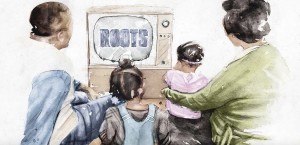May 2016
“Roots” remains a touchstone for its portrayal of an African-American family over generations; decades later, the miniseries’ themes, and artistic influence, couldn’t be more relevant.
A poignant, painful and ultimately empowering family story, “Roots” was the rare cultural event that combined unthinkable reach — around half of the 220 million Americans alive in 1977 watched at least a part of “Roots” — with incredible intimacy.
Based on Alex Haley’s Pulitzer Prize-winning book, the show introduced viewers to Kunta Kinte, Kizzy and Chicken George. The series showed African-Americans an example of their own family backstory and, on a broader scale, presented America with a story central to its past.
Declared “the single most spectacular educational experience in race relations in America” by Vernon Jordan, former Urban League president, its powerful storytelling has made it a wellspring of cultural and artistic influence. With so much to say about identity and perspective, the multigenerational saga still inspires American art and society today.
1977
Roots Miniseries:
A Cultural Phenomenon
Released during the U.S. bicentennial, the powerful saga honored essential truths of the American experience and set off a groundswell of African-American pride.
in the simpler media landscape of the late ‘70s, networks considered a show a blockbuster if it was watched in three of every 10 households. When “Roots,” a 12-hour miniseries exploring the multi-generational story of an African-American family, made its historic premiere on ABC during the last week of January in 1977, it could be found on more than half of the nation’s televisions (that night in Los Angeles, the share was 67 percent).
When putting the estimated audience of 130 million into perspective,one network executive said, “it’s like millions of people reading the same book simultaneously.”
Author and journalist Alex Haley made his name exploring different chapters of the African-American story, from Malcolm X to Miles Davis, and the blockbuster miniseries adaptation of his best-selling 1976 masterpiece “Roots” was a prologue to them all. Haley’s family story tells “the symbolic saga of a people,” a tale far more universal than even the most compelling celebrity interview.
Chasing the answer to a simple question of origins, which required the author to spend 6,500 hours in 57 libraries and archives, led to profound answers.
1977
Kunta & Kizzy
Become Popular Baby Names
By making African-American identity and the power of a name the focus of a prime-time phenomenon — “My name is Kunta Kinte!” — “Roots” inspired a naming frenzy.
“Roots” unprecedented success established a place for the story in the national conversation and inspired millions to explore and embrace their own roots. Letters to the National Archive, where Haley did much of his research, tripled and rival networks sought to produce similar sagas.
But perhaps most importantly, the miniseries created a renewed interest among African-Americans in exploring and honoring their own roots. Kunta, the young Mandinka man at the center of the story, and Kizzy, his daughter, inspired a trend in baby names — in February 1977 alone, the name Kunta was given to at least 20 babies in New York, 15 in Los Angeles, and 10 in Detroit.
Along with an exponential upswing in African travel and tourism, which one tour leader said had hit the industry “like a bomb, a very positive bomb,” the naming frenzy put the unique nature of the story’s influence into perspective. Nefhertiti Reid, a Harlem resident who gave birth to Kunta Kinte Reid on Feb. 18, 1977, said her son’s name was a symbol of self-awareness and pride. “Like Kunta Kinte, he should be free,” she told The Times then, “and he should be somebody and know he’s somebody.”
1987
Kunta Kinte
A Cultural Force on Cinema
A go-to symbol of a shared culture, the character at the core of the “Roots” saga is recognized as cultural shorthand in modern cinema.
“Roots” had such impact due not only to its unvarnished presentation of history — “Shaft” star Richard Roundtree, who made a cameo in the miniseries, said “you got a sense of white Americans thinking, ‘Damn, that really happened'” — but for presenting the story from the black point of view, devoid of stereotypes. Few characters have resonated with the culture at large more than Kunta Kinte. So when a new generation of African-American filmmakers in the late ‘80s and early ‘90s, raised on the “Roots” saga, began tackling issues of race in their early films, it’s no surprise that the series’ main character was referenced.
Kunta Kinte is namechecked in movies set on the East Coast — think Spike Lee, playing Mookie the Brooklyn deliveryman in his classic “Do The Right Thing ” — and the West Coast — Doughboy from John Singleton’s 1991 “Boyz in the Hood.” And Kunta’s cultural import went beyond cutting-edge cinema. No less a mainstream figure than the “Fresh Prince of Bel Air” made a reference, reflecting the continued relevance of “Roots.”
1994
The birth of a lion
Recalls Iconic Roots Moment
An animated anointing reminds viewers of “Roots” and puts cultural traditions in the spotlight.
The iconic scene when Simba, the lion cub, is held aloft in Disney’s African fable “The Lion King,” mirrors a similar scene in “Roots” when Kunta Kinte is thrust toward the sky during his naming ceremony and told, “Behold! The only thing greater than yourself.” Both moments point to how the hit movie and miniseries referenced, and helped familiarize, audiences with African traditions and cultural rites. The NBA’s Denver Nuggets now even feature the “‘Lion King’ Cam” at home games. Lucky parents can be seen striking the pose with their children on the stadium’s Jumbotron.
In “Roots,” the Muslim holy man of the town of Juffure in The Gambia presents the baby Kunta, asking for blessings from Allah, and declares his name will be Kunta, the middle name of his grandfather. A key part of Haley’s rich portrait of life in Kunta’s home region of Africa, this scene and others like it put the spotlight on an underrepresented culture in TV and film. The portrayal made such an impression on the modern day residents of Juffure that when Haley visited the village he was warmly embraced and welcomed as one of their own.
2000
African-American
Search for Family History
Inspired by Haley’s quest for self-awareness, genealogy has become more mainstream and embraces African-American history.
The lineage at the center of the “Roots” saga speaks to the complicated family histories common to African-Americans that, severed by the trans-Atlantic slave trade, are often difficult to trace. Haley’s arduous trek through history, which relied on years of detective work, served as an inspiration for similar family searches.
With the advent of digital archives, similar searches have become much easier and more robust, and recent advances in genetics and biotechnology, such as 23andMe, have made learning about personal history much more accessible. Henry Louis Gates, Jr. and his PBS series “African American Lives” and “Finding Your Roots,” which uncovered the family stories of prominent African-American celebrities such as LL Cool J, Condoleezza Rice and Samuel L. Jackson, further popularized the search. Today, numerous DNA testing and research projects have augmented widely available genealogical records with hard facts about ancestry and countries of origin.
2015
Roots Influence
On hip-hop
“Roots,” nearly 40 years on, continues to inspire multiple generations of hip-hop artists.
“Roots”, which aired during hip-hop’s birth pangs, has been part of the genre’s vocabulary from the beginning. Numerous rappers have referenced Kunta Kinte, from Missy Elliot and Busta Rhymes to Future and Jurassic 5, with many mirroring his steadfast demand for respect and recognition.
On his critically-acclaimed album “To Pimp a Butterfly,” an instant inductee into the West Coast hip-hop canon, Compton rapper Kendrick Lamar became the latest to make the same lyrical connection. On “King Kunta,” a song that confronts neighborhood realities and cries for social justice, Lamar makes a pointed reference to one of “Roots’” virtuous and oppressed heroes — “everybody wanna cut the legs off him.” Like the character he references, Lamar’s voice embodies black pride.
The rich oral history seen in “Roots” shows how revisiting and reappraising history bolsters family connections, culture and pride. HISTORY’s reimagining of the groundbreaking series, incorporating new research and insight gathered over the nearly 40 years since the original miniseries premiered, connects us to a shared history.The connection is collective and personal; after miniseries producer Mark Wolper (son of original “Roots” producer David Wolper) showed the original to his children, their reaction inspired him to revisit the story for a new generation. By establishing a dialogue between past and present, we may look forward to a more hopeful future.

